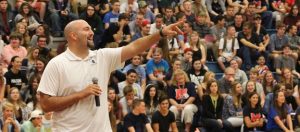Anthony Ianni is a National Motivational Speaker for the Relentless Tour to eradicate bullying, an initiative of the Michigan Department of Civil Rights. Anthony was diagnosed on the spectrum with Pervasive Developmental Disorder at the age of four and struggled with bullying throughout childhood. He rose above the low expectations of doctors and specialists to graduate from Michigan State University and play basketball for Tom Izzo during his time there. He was the first Division 1 Basketball player in NCAA History to be diagnosed with autism. This week Anthony shared some of what he has learned about bullying and autism advocacy.
You’ve said that one way you were bullied as a child was through exploitation of your gullibility. Is there a way for this specific type of bullying to be addressed/prevented?
The way it can be addressed it through awareness. I can proudly say I’m addressing it every day with my school and community presentations. So the more we bring awareness to this topic, the better will know and understand it.
What helped you rise above the bullying you experienced growing up?
Just knowing that if I let my actions do the talking for me, then my bullies will back off. That’s basically what happened, especially with my success I had on the basketball court in high school. People saw what I did on the court and how hard I worked on my game. That’s when I really earned a lot of respect from people.
What can parents do to help their children who are experiencing bullying in school?
I think parents can help their kids by just having a conversation at the dinner table with them. I’ve always told people how everything starts at home, and by having conversations with your kids about bullies and treating each other with respect can go a long way away.
What challenges did you face as an athlete on the spectrum? Were there any accommodations you needed to excel in this area? How did the schools you attended and/or coaches you played for meet your needs?
I think the only challenges I experienced were understanding sarcasm from some of my teammates and understanding some of the court tasks that needed to be done. I really didn’t have any accommodations for this because all of my coaches were aware of me being on the spectrum, and they just told me if I needed help or needed to ask a question to speak up and not be afraid. So all of my coaches in college and high school really helped me understand things better–basketball wise–and really helped me in a lot of other ways as well.
Based on your personal experience as well as what you’ve seen while traveling to other schools, what are schools doing well in with regard to autism education and where can they improve?
I’ve seen a ton of schools starting links and peer-to-peer groups, which I’ve been a huge fan of in schools. And I’ve also seen how a lot of schools are doing events for autism awareness month and their community events. I think that more schools can still get involved and promote more autism awareness and improve in that area.
What mistakes do autism advocates make?
Honestly I really haven’t seen too many autism advocates make mistakes. Every advocate that I’ve met or presented with has been great and had a lot of great knowledge. If anything, I still think we, as advocates, need to keep getting the word out there even more, so others can follow our lead. I’m on the road speaking 5 days a week, and I’m trying to make sure that the ASD community has a voice that people can hear and follow for a long, long time.
What can parents do to advocate for their children on the spectrum as well as teach them to be self-advocates?
Parents just need to continue to be the voice that their kids need and teach them about who they are and how they’re advocating for their kid and pass that passion and information down to them. They can also show their kids and teach them about other great advocates like myself, Temple Grandin and others, and tell them about the great work we’re all doing for our community.

